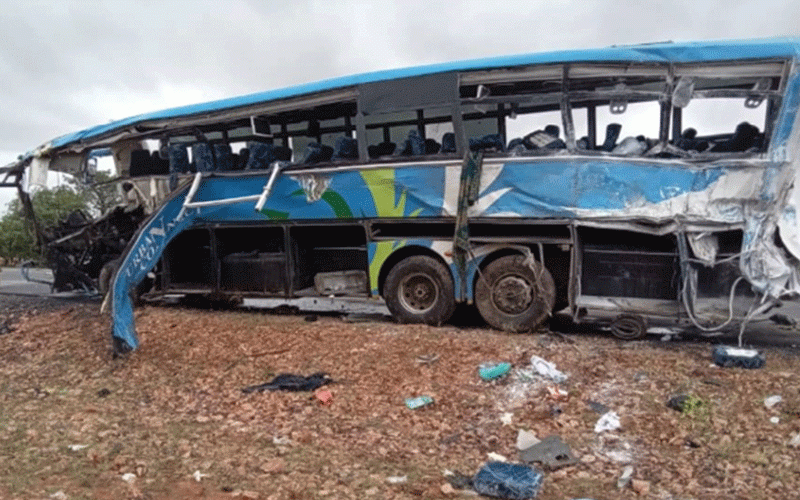
SOCIAL media was in flames last week with public health centres being topical following the fatal Beitbridge accident that claimed the lives of 25 people and left many others seriously injured.
May the souls of the departed rest in peace.
Zimbabwe has witnessed a lot of accidents that are attributed to negligent driving, with speeding and drunken driving being the major causes of the road carnage.
It is high time strict laws were put in place to reduce the number of accidents on our roads.
The injured were ferried to Beitbridge District Hospital by ambulances as well as private vehicles provided by Good Samaritans.
What is flabbergasting is the state of the receiving hospital, which struggled to cope with the unprecedented increase in patients.
It is undeniable that our hospitals are grossly understaffed, medicines are scarce and equipment is obsolete. Patients were filmed having cardboard immobilisation while admitted to hospital, an unfortunate situation that makes our country the subject of ridicule.
It is acceptable to use cardboard to immobilise a limb as first aid if a fracture is suspected but that should be removed at hospital for immobilising splints or even backslabs after an X-ray is done to locate fractures.
- Mavhunga puts DeMbare into Chibuku quarterfinals
- Bulls to charge into Zimbabwe gold stocks
- Ndiraya concerned as goals dry up
- Letters: How solar power is transforming African farms
Keep Reading
Our country is laughing stock given gross shortages of basic life-saving items in hospitals.
This problem is traced to incessant under-funding of the health sector because authorities are not giving it priority.
Our health delivery system is in shambles, exacerbated by brain drain as experts trek to greener pastures, yet the country has capacity to retain skilled workers.
Political will is really lacking as priority is given to things that have little bearing to the betterment of the country as our leaders are focused on self-aggrandisement at the expense of service delivery.
Corruption is rampant in the country with at least US$2 billion being lost to this scourge, an amount which is enough to construct at least 40 state-of-the-art hospitals in the country per year.
It is prudent to strengthen our health system and those in power should understand that one of the days, they may need the same healthcare facilities they neglected during their time in power.
The COVID-19 pandemic should have taught us a lesson that banking on foreign hospitals for our health is suicidal after all countries in the world closed their borders, refusing to accept foreign patient.
The attainment of Vision 2030 in fulfilment of the health pillar will be a mountain to climb if we do not change our attitude towards our own health delivery system.
Zimbabwe is known for crafting brilliant “visions”, but many of them fail at implementation stage, our poor track record says it all.
Robert Waterman and Tom Peters came up with the Mkinsey 7S model in the 1980s to improve organisational effectiveness and alignment.
Issues of strategy, structure, systems, shared values, skills, style and staff need serious consideration if we are to be successful in whatever endeavour we embark upon. I always wonder if we have the right people with the required skills to implement what we craft.
Favouritism, cronyism and nepotism have destroyed our country, a country that has unemployed professors, doctors and many holders of Masters degrees.
Government should be serious when it comes to equipping public hospitals, especially central hospitals, some of which are grappling with water supply challenges, obsolete equipment and drug shortages to mention just a few.
It is a pity that many lives are being lost yet our country is replete with natural resources, which we could have utilised to save some of our departed friends and relatives.
My heart bled when I learnt of United States President Donald Trump’s radical foreign policy aimed at cutting foreign aid to many countries.
The US is withdrawing from the World Health Organisation whereas its agents like the United States Agency for International Development and President’s Emergency Plan for Aids Relief have been at the forefront of funding HIV and Aids programmes in many countries.
We pray that we manage to develop quick-funding models lest we start to experiencing acute shortages of anti-retroviral drugs in the country.
Our Aids levy hasn’t been enough to cover the 1,2 million people who are on anti-retroviral treatment.
The National Aids Council (NAC) should concentrate its energy on acquiring drugs for the country, otherwise we are doomed.
This is not the time for lavish lifestyles at NAC nor the time to purchase latest model vehicles.
We need more accountability at NAC.
Let us work for the betterment of our health delivery system.
Tomorrow, you will need the same hospital you are neglecting today.
Johannes Marisa is a medical practitioner who is the current president of the Medical and Dental Private Practitioners Association of Zimbabwe.










